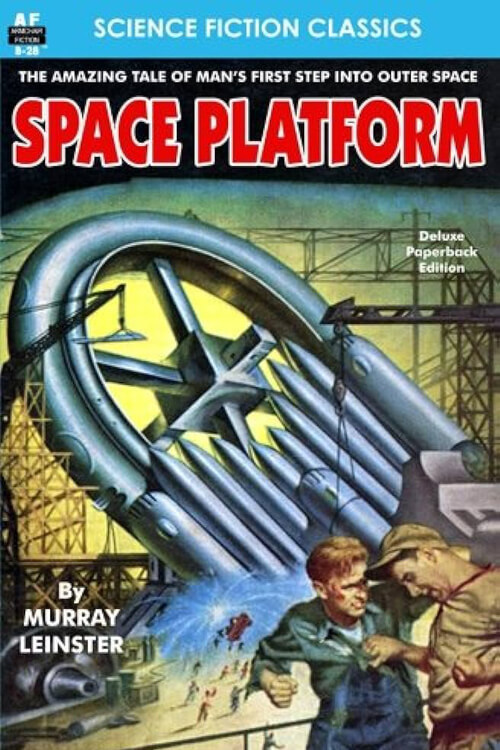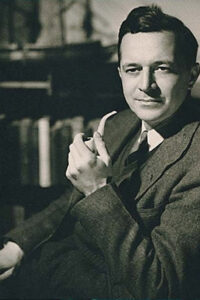
Space Platform
There wasn’t anything underneath but clouds, and there wasn’t anything overhead but sky. Joe Kenmore looked out the plane window past the co-pilot’s shoulder. He stared ahead to where the sky and cloud bank joined—it was many miles away—and tried to picture the job before him. Back in the cargo space of the plane, there were four big crates. They contained the pilot gyros for the most important object then being built on Earth, and it wouldn’t work properly without them. It was Joe’s job to take that highly specialized, magnificently precise machinery to its destination, help to install it, and see to its checking after it was installed.
He felt uneasy. Of course, the pilot and co-pilot—the only two other people on the transport plane—knew their stuff. Every imaginable precaution would be taken to make sure that a critically essential device like the pilot gyro assembly would get safely where it belonged. It would be—it was being—treated as if it were a crate of eggs instead of massive metal, smoothed and polished and lapped to a precision practically unheard of. But just the same Joe was worried. He’d seen the pilot gyro assembly made. He’d helped with it. He knew how many times a thousandth of an inch had been split in machining its bearings, and the breath-weight balance of its moving parts. He’d have liked to be back in the cargo compartment with it, but only the pilot’s cabin was pressurized, and the ship was at eighteen thousand feet, flying west by south.
He tried to get his mind off that impulse by remembering that at eighteen thousand feet a good half of the air on Earth was underneath him, and by hoping that the other half would be as easy to rise above when the gyros were finally in place and starting for space. The gyros, of course, were now on their way to be installed in the artificial satellite to be blasted up and set in an orbit around the Earth as the initial stage of that figurative stepladder by which men would make their first attempt to reach the stars. Until that Space Platform left the ground, the gyros were Joe’s responsibility.
The plane’s co-pilot leaned back in his chair and stretched luxuriously. He loosened his safety belt and got up. He stepped carefully past the column between the right- and left-hand pilot seats. That column contained a fraction of the innumerable dials and controls the pilots of a modern multi-engine plane have to watch and handle. The co-pilot went to the coffee shop and flipped a switch. Joe fidgeted again on his improvised seat. Again he wished that he could be riding in the back with the crates. But it would be silly to insist on perching somewhere in the freight compartment.
Read or download Book
Murray Leinster
Murray Leinster (June 16, 1896 – June 8, 1975) was the pen name of William Fitzgerald Jenkins, an American writer of genre fiction, particularly science fiction. He wrote and published over 1,500 short stories and articles, 14 movie scripts, and hundreds of radio scripts and television plays.
Biography.
Leinster was born in Norfolk, Virginia, the son of George B. Jenkins and Mary L. Jenkins. His father was an accountant. Although both parents were born in Virginia, the family lived in Manhattan in 1910, according to the 1910 Federal Census. A high school dropout, he nevertheless began a career as a freelance writer before World War I.
He was two months short of his 20th birthday when his first story, “The Foreigner,” appeared in the May 1916 issue of H. L. Mencken’s literary magazine The Smart Set. Over the next three years, Leinster published ten more stories in the magazine; in a September 2022 interview, Leinster’s daughter stated that Mencken recommended using a pseudonym for non-Smart Set content. During World War I, Leinster served with the Committee of Public Information and the United States Army (1917–1918).
During and after the war, his work began appearing in pulp magazines like Argosy, Snappy Stories, and Breezy Stories. He continued to be published regularly in Argosy into the 1950s. When the pulp magazines began to diversify into particular genres in the 1920s, Leinster followed suit, selling jungle stories to Danger Trails, westerns to West and Cowboy Stories, detective stories to Black Mask and Mystery Stories, horror stories to Weird Tales, and even romance stories to Love Story Magazine under the pen name Louisa Carter Lee.






